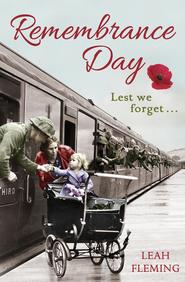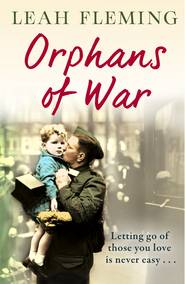По всем вопросам обращайтесь на: info@litportal.ru
(©) 2003-2025.
✖
The War Widows
Автор
Год написания книги
2018
Настройки чтения
Размер шрифта
Высота строк
Поля
Suddenly Ana shivered and her heart went thump, thump. No one was coming. She would be sent back home, abandoned. Did they not know she could never go back home: an unmarried woman with a child, dishonouring the family name for ever? It was better they thought her dead.
A strict code of honour had been broken. On Crete women like herself were shadows, fit only to live in caves, out of sight. It would kill her mother to bear such disgrace. If there was anything of her village left since the Germans invaded Crete in 1941…But why think on those things? What was done then was done in the name of duty. What she did in Athens was done for love and gratitude. He would not let her down. It tore her heart to be an exile but that life was over. To open such memories was like unlocking her battered case left behind in Canea, her hope chest, smelling of camphor, stuffed with postcards, embroidered linen, lace work, damp and discoloured with age, her frayed dowry never to be redeemed: all those long-faded hopes and dreams like butterflies that have lost their wings.
War washed away all that past life and the age-old customs that went with it. Her only duty now was to survive for her child’s sake. This was the start of a new life together.
But dreams betrayed her each night when the island came alive: a wine-dark sea shimmering at sunset, the green mountains of the Apokoronas, snow-capped, stretching high in the distance, and the soft breezes off the shore stroking her cheeks. She could smell the scents of home: wild thyme, lemons, and watermelons like footballs. She tasted honey and sand on her lips. In the shade of the vines the zizzies screeched.
Suddenly the scene would change to smoke and darkness, the stench of burning rubber and cordite, on that first morning of invasion.
Ana was too busy in the makeshift hospital to watch more parachutes descending into the olive groves around the city of Canea. The daily bombardment crushed the harbour buildings, trapping whole families, men and boys digging them out with their bare hands. Everyone lay in wait for the one doctor while she and the other nurses wiped blood and tried to clean bandages. Her apron was filthy, her copper hair spilling out of her headscarf, but there was no time for neatness.
‘More white devils’ umbrellas from the sky,’ shouted a terrified woman. Their beloved island was being attacked again. Around her were British Tommies prostrate with mortal wounds. The bombs had done their worst and they were soft targets. This was no time for politics. It was enough to know Stelios, her brother, was out there shooting anything that moved. Their stone house had a cool cellar; she hoped Mother, Eleni and Aliki were hiding. How many times had this town suffered the aggressor?
‘Look, Ana…it’s like shooting birds out of the sky…pot shots,’ someone laughed. Parachutes descending like coloured balloons onto the shore, the groves, rooftops. Guns blasting out from Malaxa’s hilltop battery.
For months they’d been waiting, feeling the tension as British troops built defences-tired men evacuated from the mainland, ill equipped, with sallow-cheeked pale faces, who were wondering just why they were there. Her father was fighting with the Fifth Cretan Brigade far away in Northern Greece. With all their crack troops far from home, now the city was left to boys and old men, who must defend their honour or die in the effort. Freedom or Death! This was their slogan.
All morning they brought in wounded men. There were tales of Germans butchered on the roofs even as they fell, but this was the Red Cross and they must accept any wounded, whatever the uniform.
‘That’ll teach them,’ sighed Dr Mandakis, grim-faced as he covered the sheet over yet another enemy soldier, hacked to pieces by the fury of the mob.
Now the wounded were piled alongside each other, enemy, defender, stranger and known faces from the city streets. The medical staff worked by lamplight, stitching, sewing flesh together, mopping brows of amputees, giving sips of precious water to the dying.
I shall recall this day for the rest of my life, thought Ana, seeing sights no decent woman should have to witness, and still they came…
There were rumours, rumours of street-to-street fighting, children carrying scythes and axes going out to meet the foe and showing them no mercy.
If they win, we shall pay for this, Ana sighed, with a chill in her heart. There are too many of them.
Her back ached with weariness. It was looking more like a butcher’s shop than a makeshift hospital. Someone had made a Red Cross flag out of sheets and daubed it with blood to hang over the roof. Perhaps when the bombers returned it might save them.
The young nurses took it in turn to relieve themselves, sip lemon water, bite on the hard dacos bread, anything to stop the hunger.
At dusk, Ana found herself by the temporary mortuary, no longer sickened by the stench of blood and death. It was not a place to linger but it was cool and quiet. She sat down, too tired even to pray. How could things happen on such a beautiful May morning, when all the roses and flowers were still in bloom?
Then she heard a strange moan. Her heart jolted: a groan was coming from under the sheet, then another groan. Someone was alive under that sheet, waiting to be buried alive in a shroud. She thought she was dreaming. Tiredness must be taking its toll. She walked silently towards the sound, stepping over a line of stiff bodies on the floor. There it was again, and she pulled back the sheet.
Under it was a soldier in olive-green fatigues, fair-haired, his blue eyes flecked with navy blue, staring at her in terror.
‘Hilfe…hilfe.’ His eyes cried out to her. Here was the enemy at first hand, a boy no more than her age, lying terrified, at her mercy, mistaken for dead. She saw the deep bruises on his battered cheeks.
In that moment, Ana knew she could silence him for ever, call for one of the guards to finish him off. But she was transfixed, unable to think. The world stood still. She was a Red Cross nurse, dedicated to taking no sides. But he was the enemy, this bronzed, handsome boy. His eyes were pleading for life. This man had a mother and family far from home. He was serving his country, doing his duty, but on her island.
‘Oh no!’ she panicked, pulling the sheet off him. There was a side door where the carts came to collect the bodies. It was dark.
He staggered to his feet, dazed, wobbling.
‘Go!’ She pointed to the door.
‘Danke, Fraulein…Mein Name ist Otto…Wie heissen Sie?’ He towered above her. This boy wanted to know her name?
‘Oxi…no name,’ she croaked in broken English, having no German. ‘Go!’ she ordered, opening the door into the dark narrow street. The boy staggered out into the alley, defenceless but alive, soon swallowed up into the night.
Ana slammed the door, pulled away the sheet and dragged the bodies to fill his gap, appalled at what she had just done. I have betrayed my country, God help me! She crossed herself. No one must ever know of this treachery or her family would be dishonoured for ever.
Feeling sick, exhausted and defiant at her action, she struggled to justify what she had just done. Surely the boy would be felled before he left the winding alleys of the Venetian port? He was an easy target, even for a child. Ana shuddered. Her duty lay with the living, not the dead.
‘Ana! Ana! Where are you? Have you been asleep?’
Perhaps it was a dream, just a nightmare, and tomorrow she’d find it had been all a figment of her imagination.
But when the sun rose like a ball in the east, nothing had changed. She had met the enemy and his name was Otto. His face haunted her dreams. For that one act of mercy, she’d been punished over and over, but now there was no time to dwell on such horrors.
The two women sat together on the bench, moving closer as if to gain courage from one another. The daughters on their knees reached out to one another. A tall woman walked past them, staring. Someone brought them a cup of tea and they sipped it politely. Ana did not know what to say to introduce herself to the oriental girl, even though her English was better than most.
‘You wait also for soldier boy to come?’ she asked, looking again at the clock on the wall. ‘It is late.’
‘Mr Stan will not forget. I wrote many times,’ smiled the young woman, sipping the tea, her back straight. Her voice was clipped but the English was good.
‘My man is at camp, maybe come. Maybe he send someone,’ Ana nodded. ‘Where you stay, in Manchester?’
‘No, it is a town called Grimbleton. I will live with his family when he is a soldier. I sent a telegram. He will come soon…This is not tea.’ She grimaced, trying to swallow the terrible taste, and Ana laughed. She would never get used to this dishwater either.
‘We go Grimbleton also,’ Ana nodded, wishing this drink was hot strong Greek coffee with glyka–lots of sugar-but she had not tasted real grains for years. ‘My man has a house there for us to stay, my fiancé.’ She paused. She wanted to be thought respectable, even to a stranger.
‘We shall see each other in the village then?’ answered the other mother.
Ana nodded at the tiny woman, who was sitting so pert, her glossy, black hair in a neat bun at the nape of her neck. Her face was heart-shaped. With those wide eyes and dusky skin, she looked delicate, like a china doll. ‘Where you come from?’ Ana asked.
‘London…it has been a long way, a long story to tell,’ the other woman replied, her eyes lowered as if she did not want to be reminded of her past. ‘And you?’
‘I come from Athens…Greece.’ Ana did not want to give her true identity. ‘It is a long story how I come to Manchester with my Dina.’ They smiled politely and fell silent.
‘Your child has hair like gold,’ sighed the oriental girl. ‘My soldier has hair like a sunset too. It is not a colour we see often in hair. Somewhere I have a picture. Would you like to see my intended?’ She was rummaging through her straw holdall but stopped suddenly to inspect a man as he hurried over to the desk looking in their direction.
He was tall and lanky, dressed in a black suit with hair flattened down into a centre parting, on his face a thin moustache. The officer looked at them both, gathered up his papers and strode across towards them.
‘No one’s come for you yet? Are you sure you’re in the right place? This is Manchester. You can’t stay here much longer.’
Ana looked at her neighbour and promptly put her cup down. ‘I go nowhere. I wait here. They will come.’ She had been in too many displaced persons’ camps not to know how to get attention. Making a fuss had saved her life, got her food, got her and Dina safe passage. She would open her blouse. That soon got them going. She was a proud daughter of Crete but she knew how to fight. But first she must give him the facts. ‘I have letter. This is right town. I not move. I have baby to feed,’ she pleaded. One thing she had learned about the English was they didn’t like a fuss: no loud voices, tears or wailings. They liked fair play but done quietly, no digging in of heels.
‘I also have a letter,’ chirped in her neighbour. ‘We will wait.’
‘Please yourselves, but if no one’s come to collect you soon…’ the official sniffed.
‘They will come,’ they said as one, more in hope than certainty.
By the time Lily made her late entrance through the foyer of Ringway Aerodrome there was no one waiting for her; only an escort officer giving two foreign girls an ultimatum.










